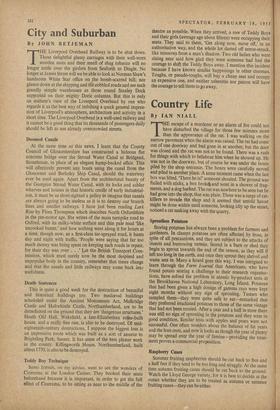By JOHN BETJEMAN T HE Liverpool Overhead Railway is to be
shut down. Those delightful glassy carriages with their well-worn wooden seats and their smell of shag tobacco will no longer rattle over the girders from Seaforth to Dingle. No longer at James Street will we be able to look at Norman Shaw's handsome White Star office on the bomb-scarred hill; nor glance down at the shipping and the cobbled roads and see such grandly simple warehouses as those round Stanley Dock supported on their mighty Doric columns. But this is only an msthete's view of the Liverpool Overhead by one who regards it as the best way of imbibing a quick general impres- sion of Liverpool's atmosphere, architecture and activity in a short time. The Liverpool Overhead is a well-used railway and it cannot be a good thing that its thousands of passengers daily should be left to use already overcrowded streets.
Doomed Canals At the same time as this news, I learn that the County Council of Gloucestershire has constructed a hideous flat concrete bridge over the Stroud Water Canal at Bridgend, Stonehouse, in place of an elegant hump-backed affair. This will effectively prevent any boats using the canal from the Gloucester and Berkeley Ship Canal, should the waterway ever be used again. Apart from the architectural beauty of the Georgian Stroud Water Canal, with its locks and ashlar wharves and houses in that historic cradle of early industrial- ism, it must be as short-sighted a policy to imagine that canals are always going to be useless as it is to destroy our branch lines and smaller railways. I have just been reading Lark Rise by Flora Thompson which describes North Oxfordshire in the pre-motor age. She writes of the main turnpike road to Oxford. with its milky-white surface and thin pale mud 'like uncooked batter,' and how nothing went along it for hours at a time, though now, as a first-class tar-sprayed road, it hums day and night with traffic. 'People were saying that far too much money was being spent on keeping such roads in repair, for their day was over . . .' Let the British Transport Com- mission, which must surely now be the most despised and unpopular body in the country, remember that times change and that the canals and little railways may come back into usefulness.
Death Sentences This is quite a good week for the destruction of beautiful and historical buildings too. Two medieval buildings scheduled under the Ancient Monuments Act, Melkridge Castle and Haltwhistle Castle, Northumberland, are to be demolished on the ground that they are 'dangerous structures.' Heath Old Hall, Wakefield, a late-Elizabethan stone-built house, and a really fine one, is also to be destroyed. Of mid- eighteenth-century destructions, I suppose the biggest loss is an impressive room which was built as a sort of annexe to Brightling Park, Sussex. It has some of the best plaster work in the county. Killingworth House, Northumberland, built about 1770, is also to be destroyed. theatre as possible. When they arrived, a row of Teddy Boys and their girls (average age about fifteen) were occupying their seats. They said to them, 'Get along now, move off,' in an authoritative way, and the whole lot darted off terror-struck, like minnows from a man's shadow. Two old ladies who were sitting near said how glad they were someone had had the courage to shift the Teddy Boys away. I mention this incident because I have known similar happenings in other cinemas. Toughs, or pseudo-toughs, will buy a cheap seat and occupy an expensive one, and neither usherette nor patron will have the courage to tell them to go away.










































 Previous page
Previous page